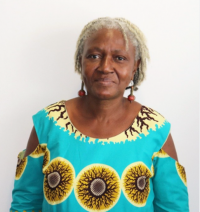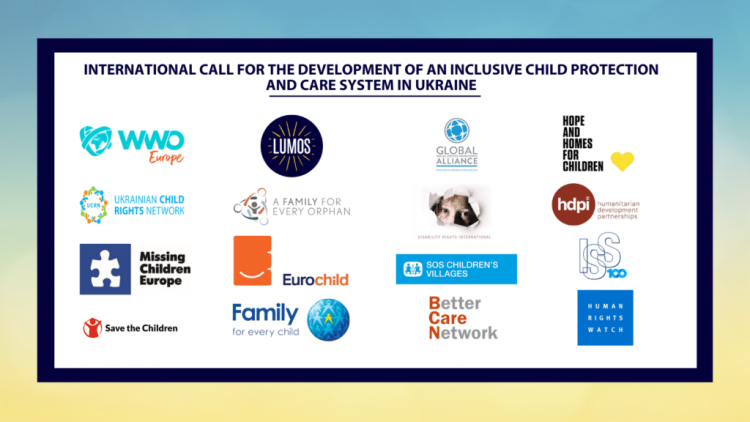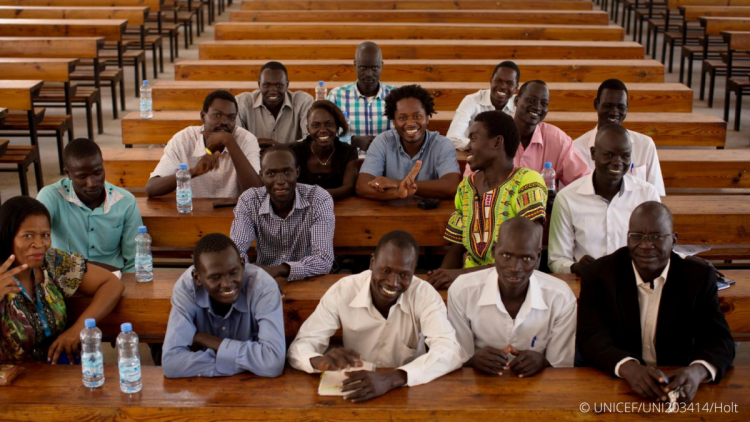
What a Small Group of Committed Citizens Can Achieve: Reflecting on 10-years of Impact by the Alliance
Submitted by Alena Sherman on Fri, 10/13/2023 - 1:03pmby Kathryn Conley Wehrmann, PHD, LCSW, Global Social Service Workforce Alliance Steering Committee Chair
"Never doubt that a small group of thoughtful, committed citizens can change the world; indeed, it’s the only thing that ever has…" -Margaret Mead
As I began to write my blog post in observance of Social Service Workforce Week and the 10th Anniversary of the Global Social Service Workforce Alliance, a unique network of which I’m privileged to serve as chair, Margaret Mead’s famous quote kept coming to mind. Nearly thirteen years ago the United States President’s Emergency Plan for AIDS Relief (PEPFAR) organized a conference in Cape Town, South Africa to address key challenges facing the social service workforce at all levels. It was at this gathering that a committed group first came together and proposed the concept of a global alliance as the best way to join forces to develop and disseminate knowledge and support those engaged in strengthening the workforce in low- and middle-income countries.
It was in preparing for this Cape Town conference, that a Framework for Strengthening the Social Service Workforce was first developed. The Framework proposed an approach based on three pillars—planning, developing and supporting the workforce—that would also recognize and build on each country’s specific context, including social service, justice and child protection systems, culture, local legislation, labor market, and economy. The framework was revised and finalized during the Cape Town conference and has since been widely used throughout the world to guide workforce strengthening.
Following the conference, a Steering Committee was formed and charged with providing strategic direction to the Global Social Service Workforce Alliance (or Alliance). Its first job was to hire our first director, Amy Bess. Thanks to funding from PEPFAR the Alliance was officially launched on June 6, 2013. Since that time the Alliance has united more than 3,500 diverse members engaged in workforce strengthening from across 150 countries for collaboration and knowledge exchange. We’ve also produced nearly 30 technical resources to support global efforts to plan, develop and support the workforce. This includes our annual State of the Social Service Workforce Report through which we have analyzed workforce-related trends and lessons learned in over 70 countries. In addition, through our workforce assessments and strategic advice we’ve assisted over 40 national governments to develop plans and initiatives to strengthen their social service workforce and improve the systems that ensure the well-being of at-risk populations. Starting in April of 2014, we began hosting Social Service Workforce Week to brings special attention to the need for a strong social service workforce, with at least 35 organizations joining in on the advocacy efforts every year. And, this is all just a snapshot of what the Alliance has done to support and champion the workforce over the last 10 years.
The small group of world citizens that proposed the formation of the Global Social Service Workforce Alliance, as well as those who have stepped up to serve on its Steering Committee and those who have partnered and collaborated with the Alliance, have been catalysts for positive change in the world and the result is a stronger workforce, empowered with knowledge, practice expertise, and opportunities to collaborate. It is clear that what started as a vision in Cape Town has truly become an effective force in responding to new challenges that countries have had to face over the last 10 years—including the COVID-19 pandemic and the increasing effects of climate change and the humanitarian needs brought about by war. Looking to the future, I am hopeful and excited about what the next 10 years will bring as the Alliance broadens its efforts in responding to the new challenges that lie ahead for the thousands who work in service to their communities.
In closing, I invite all of you who are reading this to learn more about the Global Social Service Workforce Alliance through our events and presentations during Social Service Workforce Week—I think you will be impressed by the work it has done and how it will respond to future workforce needs and challenges.

Case Conferencing Results in Positive Change for HIV-affected Youth in Zimbabwe
Submitted by Alena Sherman on Thu, 10/12/2023 - 2:32pmby Miriam Chadzingwa and Lispoh Rugaro, FACT Zimbabwe
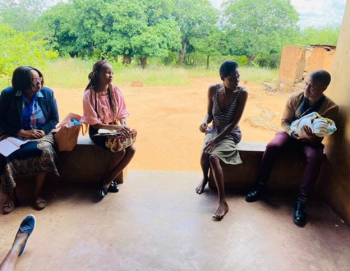 Case conferencing is a modern way of unifying multi-disciplinary professionals known to or working with a child in order to develop interventions that will more effectively address the child’s needs. Case conferencing is often used for more complicated cases after initial efforts have failed. This process is often used for children with high viral loads and more complicated cases in the SPACE for OVC program, being implemented by FACT ZIMBABWE with support from the U.S. President's Emergency Plan for AIDS Relief (PEPFAR) through the United States Agency for International Development (USAID). SPACE for OVC works in high HIV-burden districts, to help communities and local institutions provide a comprehensive set of services to improve the health, nutrition, and psycho-social well-being of HIV-affected and infected children.
Case conferencing is a modern way of unifying multi-disciplinary professionals known to or working with a child in order to develop interventions that will more effectively address the child’s needs. Case conferencing is often used for more complicated cases after initial efforts have failed. This process is often used for children with high viral loads and more complicated cases in the SPACE for OVC program, being implemented by FACT ZIMBABWE with support from the U.S. President's Emergency Plan for AIDS Relief (PEPFAR) through the United States Agency for International Development (USAID). SPACE for OVC works in high HIV-burden districts, to help communities and local institutions provide a comprehensive set of services to improve the health, nutrition, and psycho-social well-being of HIV-affected and infected children.
One such case that required case conferencing involved 14-year-old Nyasha (name changed to protect identity), who is living with HIV and was admitted to the hospital due to infections. Her mother is also living with HIV and clinically was not well, having been diagnosed with depression and a denial of HIV infection. A case conference was conducted amongst clinical and community-based partners, namely Zimbabwe Health Interventions (ZHI), Africaid, the Department of Social Development, the Ministry of Health and Child Care, Mercy Corps and Family AIDS Caring Trust Health and Case Management Officers. The outcome of the case conference necessitated provision of adherence counselling, viral load literacy, psychosocial support, cognitive behavioural therapy, child peer-to-peer counselling, food security in the form of cash transfer and safe shelter. Nyasha’s viral load is still high but within 3 months it has been greatly reduced. Her mother’s viral load is suppressed and she has re-joined an Internal Savings and Lending group paying a monthly subscription of $5USD. As a result of participating in the group, she has started a broiler project with 50 broiler chicks which have now reached maturity. Nyasha is also a FACT program participant receiving educational support assistance, and has participated in HIV/GBV violence prevention training through the ‘’No Means No’ program.
The progress made by this household is best described by Nyasha’s mother who says: “Sister I have fully accepted my situation, Nyasha’s viral load is going to be suppressed and I see myself with 100 broilers in the next 6 months. This will help me to pay fees for Nyasha and meet medical bills.”

Can Paid Internships Save Social Work?
Submitted by Alena Sherman on Wed, 10/11/2023 - 11:40pmby Pilar O. Bonilla, MSW, and Elana Metz, MSW/MPH
Not unlike other countries, the United States is experiencing a cost-of-living crisis with the price of higher education steadily rising along with the price of everything else, excluding salaries. Simultaneously, economists have warned of an impending shortage of social workers, as the profession experiences high turnover rates and low salaries, driving social workers away from the profession. In response to this shortage, social work programs are under pressure to train and graduate more social work students. Nevertheless, in their most recent annual survey, the Council on Social Work Education (CSWE), the sole accrediting body of social work education in the U.S., reported that in the last 5 years alone, there has been a substantial decline in enrollment figures for Bachelor of Social Work (BSW) programs (-18.23%), Master of Social Work (MSW) programs (-2.47%), and Social Work Ph.D. programs (-39.5%), alongside a corresponding reduction in degree conferment.
In light of the shifting socioeconomic and political landscape and its ripple effects on students’ experience with social work education, it is imperative for the profession to acknowledge and proactively respond to these pressing concerns. One long-overdue solution that would ensure the advancement and sustainability of the social work profession is to pay students for their mandatory internships.
Both within the U.S. and abroad, social work students are increasingly calling attention to the immense financial hardships they endure and the economic barrier that unpaid internships pose. Movements like “End Placement Poverty” in Australia and “Payment for Placements (P4P)” in the U.S. are urging national social work bodies, academic institutions, policymakers, and internship sites to take immediate action.
A growing body of research substantiates these claims of economic barriers and further reveals the negative effects that unpaid internships have on students' overall well-being. For example, a qualitative study of graduate social work students in Australia found that students are working excessive hours to maintain paid work alongside graduate studies and unpaid internships. As a result, students reported high degrees of stress and fatigue, detrimental impacts on their physical and mental health, and the inability to participate in social activities and maintain relationships. Unsurprisingly, these negative effects impact students’ learning experience inside and outside of the classroom, impinging upon their personal growth and development.
Unfortunately, the consequences of unpaid internships persist long after graduation in the form of overwhelming student debt. In the U.S., the average starting salary for recent MSW graduates is only $47,000. Meanwhile, MSW students graduate with an average of $68,000-$76,000 in student loans, burdening social workers and their families for decades after graduation. Notably, Black and Latino/a/e/x students graduate with significantly more debt than their white counterparts, exacerbating racial disparities and perpetuating inequality within our workforce.
Social workers are essential workers, and we need to set up our future workforce for success if we are to address the long-term workforce shortage effectively. While paid internships may not serve as a panacea for all the workforce challenges within social services, it would undeniably represent a substantial step toward addressing and mitigating numerous pressing issues within the social work profession. Paying students for their labor during their academic training could help offset the challenges deterring individuals from joining the social work profession, such as worker burnout, racial inequities, and inadequate wages. These improvements would not only improve the quality of life for trainee social workers but, by boosting recruitment and retention in the workforce, would also benefit the individuals, groups, and communities social workers work with. Furthermore, such a move would reaffirm our commitment to the values and principles of social, economic, and racial justice.
Author Bios:
Elana Metz graduated from San Diego State University with dual MSW/MPH in 2023 where she co-founded the SDSU chapter of Payment for Placements (P4P).
Pilar O. Bonilla graduated from Hunter College Silberman School of Social Work (HCSSW) with an MSW degree in 2023 where she co-founded the HCSSW chapter of Payment for Placements (P4P).

The Story of Efua
Submitted by Alena Sherman on Wed, 10/11/2023 - 11:04pmHow Ghana's Integrated Social Services (ISS) provide comprehensive assistance to child survivors of sexual violence
by Young Joo Lee, Child Protection Specialist, UNICEF Ghana
Thirteen-year-old Efua* went to live with her aunt in Bongo, a rural district in the Eastern region of Ghana, far from her birthplace in Dormaa West District. Efua's father had asked her to stay with their aunt so that she could take care of her younger cousins. However, her father did not know that the aunt's 63-year-old husband, was abusive. He repeatedly violated Efua physically and sexually. Not knowing where and how she could seek help, Efua became hopeless, scared and depressed.
The Girl Child Officer from the Ghana Education Service (GES) and the District Commission of Human Rights and Administrative Justice (CHRAJ) received an anonymous report on Efua's case. Immediately, her case was referred to the Department of Social Welfare and Community Development (DSWCD).
Bongo District is one of the 160 districts implementing the Integrated Social Services (ISS) programme, supported by the United Nations Children’s Fund (UNICEF) and the United States Agency for International Development (USAID). The ISS programme seeks to strengthen inter-sectoral collaboration among social welfare, social protection and health actors at the decentralized and national level to improve the delivery of social services across the country.
"All the social welfare staff in our district have been already trained on how to assist vulnerable children and handle child protection cases, including sensitive cases, like child sexual abuse, in line with the best interests of a child principle, considering the age, gender and ability," said Mr. John Azam, the Head of DSWCD in Bongo.
Having a well-established case management system, coordination structure and the use of Inter-Sectoral Standard Operating Procedures on Child Protection and Family Welfare allowed for swift intervention to support Efua. DSWCD and the Police quickly facilitated preliminary investigations and assessments. DSWCD staff also accompanied Efua to the hospital for essential medical check-ups and treatments. Other partners of UNICEF such as the Abuse Relief Corp, an NGO based in Kumasi, supported her by providing financial assistance to continue medical treatment and counselling services.
"All was done cooperatively, efficiently and effectively, thanks to ISS. It has really boosted our level of professionalism and our ability to help a child like Efua," explained Mr. Azam.
To help Efua with the legal process, officials from the Domestic Violence and Victims Support Unit (DOVVSU) of the Ghana Police Service provided legal aid support and referrals for medical forensics and psychosocial counselling. Judges and court staff who handled Efua’s case had prior training, with support from UNICEF, to handle cases of children as per the Child-Friendly Gender-Based Violence Courts - Operational Guidelines. These guidelines help the court staff to prevent child survivors from facing the perpetrators physically during the trial and minimize the risk of further trauma on the survivors. The perpetrator was arrested and later found guilty by the court. He was sentenced to 10 years imprisonment.
Meanwhile, Efua took temporary refuge in the Hope Children's Place, a licensed residential care facility, while the district social welfare staff contacted her parents to prepare reintegration. All steps of the case were entered into the Social Welfare Information Management System (SWIMS). Efua’s case was handed over to Dormaa West District, where she was then returned to her parents. To help Efua overcome the traumatic experiences, DSWCD staff conducted regular follow-up visits, provided counselling sessions, and referred her to education and youth services.
Today, Efua is living a happy life with her parents. She has been reenrolled in school and enjoys childhood moments with her friends. Efua smiles as she shares, "I am finally living with my own parents, who are dedicated to protect and help me. Now I feel safer and will focus on staying happy and attend school."
*Name has been changed to protect identity
“Financing for Better Care” Conference in Moldova Highlights the Crucial Role of Members of the Social Service Workforce in Collaborative Care Reform Efforts
Submitted by Alena Sherman on Tue, 10/10/2023 - 6:18pmby Beth Bradford, Senior Associate, Maestral International and Marie Blum, Program Manager of Influence, Learning and Communications, Changing the Way We Care.
In June 2023, Chisinau, Moldova played host to the Financing for Better Care Conference, a momentous gathering of leaders and advocates in the realm of care reform. This significant event brought together a diverse array of participants, including local government authorities, caregivers, care leavers, civil society representatives, ministers, parliamentarians, and renowned experts from the World Bank and the United Nations.
At the heart of the conference was a paradigm shift in Moldova's approach to financing care and safeguarding its children. Speaker after speaker emphasized the need to redirect financial resources toward family-based care, envisioning a social welfare system that could truly support all of Moldova's at-risk children. The message was clear: investing in family-based care amounts to an investment in Moldova's future, one that promises substantial dividends for generations to come.
A highlight of the event was the active participation of youth and caregivers, as showcased in the inspiring opening video. The closing statements, equally significant, reiterated the importance of their involvement. Jamieson Davies, Catholic Relief Service’s Country Manager for Moldova, emphasized the vital importance of including individuals with lived experience of residential care institutions in the process of care reform.
In the wake of this conference, Changing the Way We Care leadership engaged with key figures in the Moldovan government. The Speaker of Parliament made a firm commitment, echoed on his Facebook page, to ensure that zero children remain in institutional care while strengthening and enhancing family-based care. The Minister of Social Labour and Social Protection similarly pledged to reach the goal of zero children in institutional care, marking a shared aspiration for a brighter future.
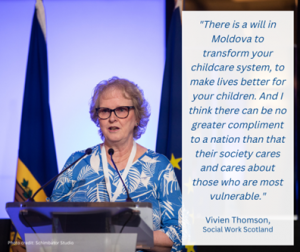 Integral to the Conference was the presentation by Ms. Vivien Thomson, the Children and Families Policy and Practice Lead from Social Work Scotland. Her valuable insights underscored the importance of investing in the social service workforce to drive meaningful care reform, and shape a better future. Drawing from lessons learned in Scotland's Getting it Right for Every Child (GIRFEC) policy framework, she illuminated the critical role of social workers and the need to empower them as the glue that holds together multi-agency teams.
Integral to the Conference was the presentation by Ms. Vivien Thomson, the Children and Families Policy and Practice Lead from Social Work Scotland. Her valuable insights underscored the importance of investing in the social service workforce to drive meaningful care reform, and shape a better future. Drawing from lessons learned in Scotland's Getting it Right for Every Child (GIRFEC) policy framework, she illuminated the critical role of social workers and the need to empower them as the glue that holds together multi-agency teams.
Ms. Thomson also emphasized the significance of early intervention, supporting families, and fostering collaboration across disciplines - principles at the core of GIRFEC. This model, grounded in research and evidence, aligns with child well-being indicators, aiming to ensure that children are safe, healthy, achieving, nurtured, active, respected, responsible, and included. The shared responsibility concept emerged as a powerful outcome of this practice model, reinforcing the collective commitment to child well-being.
Furthermore, Ms. Thomson highlighted the pivotal role played by social workers in social protection, particularly in identifying, assessing, and safeguarding individuals at risk. Their role extends to adults at risk, high-risk offenders, and children with diverse needs. However, she also emphasized the principle of minimal intervention, intervening only when necessary and using the least intrusive measures.
In conclusion, the Financing for Better Care Conference marked a watershed moment in Moldova's commitment to providing care and protection for its children. It underlined the country’s shift towards family-based care. The commitments made by Moldovan leaders following the conference herald a promising era, in which the welfare of children is at the forefront of the nation's agenda, echoing the UN Convention on the Rights of the Child and reinforcing the promise that all children should grow up in safe, nurturing, and supported families.

Returning Hope to an HIV-affected Youth
Submitted by Alena Sherman on Tue, 09/05/2023 - 5:00pmWritten by Wossen Aman, Tesfaye Deksisa and Wendwesen Endale from the Mekdim Ethiopia National Association (MENA)
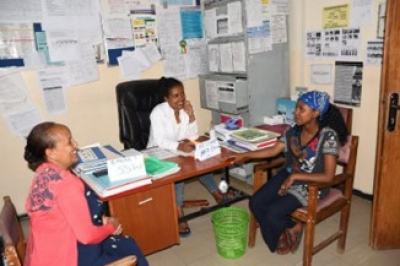 Tarikwa Tibebe, a 17-year-old girl living in Addis Ababa, Ethiopia, was diagnosed with HIV four years after she lost her mother to the same disease. After her mother's death, Tarikwa’s only living relative, her grandmother, began to care for her but did not make enough money to cover their daily living expenses or transportation fees to get Tarikwa to school. The psychological toll of her mother’s death and limited access to other support caused Tarikwa to lose hope and give up on her education.
Tarikwa Tibebe, a 17-year-old girl living in Addis Ababa, Ethiopia, was diagnosed with HIV four years after she lost her mother to the same disease. After her mother's death, Tarikwa’s only living relative, her grandmother, began to care for her but did not make enough money to cover their daily living expenses or transportation fees to get Tarikwa to school. The psychological toll of her mother’s death and limited access to other support caused Tarikwa to lose hope and give up on her education.
Emebet, a social service worker from the USAID-funded Family-Focused HIV Prevention, Care, and Treatment Services Activity and the Common Vision Development Association (CVDA), a local implementing partner under the Mekdim Ethiopia National Association, met Tarikwa while providing care and support to other HIV-affected children in the community. After speaking with Tarikwa to better understand her situation, Emebet came up with some viable ways Tarikwa could improve her life. Through Emebet’s help, Tarikwa got a part-time job as a waiter at a local café, allowing her to earn enough money to pay for sanitary supplies, food and other necessities. Emebet also supported Tarikwa in her health, ensuring that she took her medication regularily and worked with her local health facility to optain a letter to allow her to return to school. Emebet then found a volunteer to pay for Tarikwa's transportation and other school-related costs, ultimately allowing Tarikwa to return to school.
Emebet has continued to support Tarikwa in her health and schooling and has seen tremendous improvements in her psychological wellbeing as well as in her grades. Tarikwa has started to shine, always getting remarkable grades and impressing her teachers. She desires to be a clothes designer.
“I am very happy now…thanks to the social service worker and health facility staff,” Tarikwa says. “[Emebet] is a warm-hearted, dedicated hope for me to see the unseen corner of life where I envision myself as the best fashion designer. I need to thank her and others who are helping me through continued blessings and support.”

Advancing Social Work Praxis: Uniting Communities to Tackle Adversity, Vulnerability, and Trauma
Submitted by Alena Sherman on Fri, 08/11/2023 - 1:00pmWritten by Dr Poppy Masinga, President of the Association of South African Social Work Education Institutions (ASASWEI)
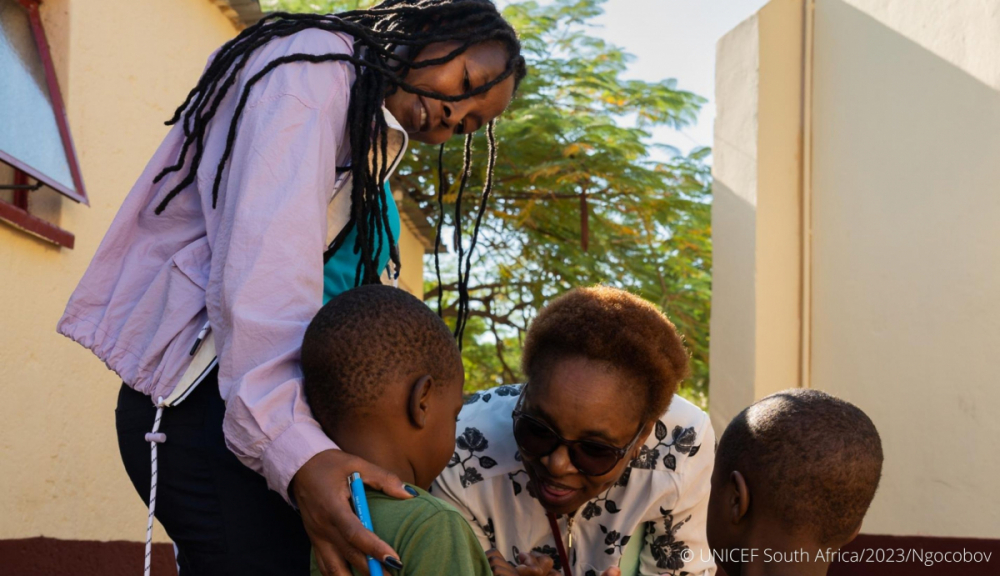 South Africa continues to experience unprecedented weather patterns that place members of society at more risk than they already are due to unabating historical inequalities and injustices linked with colonisation and apartheid. Moreover, the global community is also grappling with complex socio-economic, political, religious, and environmental challenges, which directly and indirectly impact South Africa negatively. Hence, the role of the social work profession cannot be overstated. When faced with complex national, regional, and global challenges, social service professionals serve as beacons of hope. With their vast research expertise, social work practice knowledge and skills, they inspire transformation, resilience, empowerment, and hope. Notably, the role of social service professionals in advocating for the rights of the most vulnerable members of society cannot be underestimated.
South Africa continues to experience unprecedented weather patterns that place members of society at more risk than they already are due to unabating historical inequalities and injustices linked with colonisation and apartheid. Moreover, the global community is also grappling with complex socio-economic, political, religious, and environmental challenges, which directly and indirectly impact South Africa negatively. Hence, the role of the social work profession cannot be overstated. When faced with complex national, regional, and global challenges, social service professionals serve as beacons of hope. With their vast research expertise, social work practice knowledge and skills, they inspire transformation, resilience, empowerment, and hope. Notably, the role of social service professionals in advocating for the rights of the most vulnerable members of society cannot be underestimated.
The current economic decline, including the aftermath of the KwaZulu-Natal 2022 disasters and political insurgency, persistent inequality, injustice, unemployment, poverty, violent crime, and other devastating disasters presents significant challenges to social work and other social service practitioners. Social service professionals face immense pressure, not only related to dealing with the above-mentioned adversities and traumas, but they also have to endure working under challenging conditions and resource constraints. Thus, creating a sustainable future and fostering social, economic, and environmental justice requires collaboration, networking, and partnership across various sectors. These sectors include Government Departments, Non-Governmental and Community Based Organizations, research and academic institutions, civil society, and business sectors.
Moreover, the role of the Association of South African Social Work Education Institutions (ASASWEI) is crucial in ensuring the country can withstand some of the adversities with a supply of the needed human resources who have relevant skills and competencies. To effectively intervene and address the complex intersecting socio-economic and environmental challenges, social work practitioners need to be well equipped with relevant knowledge, skills and practice techniques to become competent to intervene effectively with these myriads of complex intersecting national, regional and global socio-economic, environmental, political, cultural scourges that continue to place many individuals, families and communities at risk.
They need to graduate with the degree in social work feeling empowered to face the harsh realities of modern-day society. Hence, as ASASWEI, we endeavour to strengthen social work education, research, and practice, by ensuring that social work academics and practice placement supervisors are well equipped to train students and empower them with the knowledge, skills, and techniques to not only serve individuals, families, groups, and communities; but to also challenge unjust and ineffective policies. Moreover, social work training and practice need to emphasize empowering individuals, families, groups, and communities to be self-reliant and self-sustainable.
One way of enhancing social work training and education, research, and practice, is through knowledge production and sharing and networking platforms such as conferences, symposia, and webinars. ASASWEI is proud to be hosting the Bi-annual ASASWEI International Social Work Conference. The conference's theme, "Advancing Social Work Praxis through Strengthened Multi-Sectoral Responses to Adversity, Vulnerability, and Trauma," is a timely and relevant topic. The 2023 ASASWEI International Social Work Conference aims to provide a platform for networking and building meaningful partnerships for change. This hybrid conference will offer engagement opportunities and shared learning to enhance knowledge and skills related to multi-sectoral responses needed to address the root causes of adversity, vulnerability, and trauma linked to immense socio-economic hardships, environmental disasters, and political instabilities. Our goal is to protect human lives and promote justice and sustainable change.
Mark the Conference dates 27-29 September on your calendar and secure your spot by registering on the ASASWEI. We promise to inspire, enlighten, and transform the field of social work and other related social sciences.
Dr Poppy Masinga is the current President of Association of South African Social Work Education Institutions (ASASWEI) and is the Head of the Social Work and Community Development faculty at the South African College of Applied Psychology (SACAP).

Focusing on Care Reform and the Social Service Workforce During Ukraine Recovery Conference
Submitted by Alena Sherman on Fri, 07/07/2023 - 12:25pm From 30th June to 7th July, Alliance director, Hugh Salmon, was privileged to be able to join other national and international colleagues in London in supporting a side event, titled "Care Reform: a Ukraine Reconstruction Priority", with a senior delegation from the government of Ukraine, led by the Minister of Social Policy, Oksana Zholnovych. The focus of the event—hosted by the UK Foreign, Commonwealth and Development Office (FCDO)—was on good practice and innovative approaches to care system reform, and the development of community-based services to support children and families, including children and adults with disabilities and their families, so as to prevent the need for residential care. The conference was followed by a Ukrainian government study visit to London, hosted by FCDO, to meet central and local government colleagues, and to see a range of services for children and families. Other organisations involved in supporting the side event and study visit included UNICEF, Maestral International, Hope and Homes for Children and Lumos. The programme of visits and meetings included meetings with ministerial counterparts, the body responsible for inspecting social services (OFSTED), leading children’s NGOs and two London local authorities. A particular highlight was the session on the role of the social service workforce, hosted by the NGO Coram, which included presentations from the two Chief Social Workers for England. Valuable insights were also shared by young people with lived experience on the UK care system.
From 30th June to 7th July, Alliance director, Hugh Salmon, was privileged to be able to join other national and international colleagues in London in supporting a side event, titled "Care Reform: a Ukraine Reconstruction Priority", with a senior delegation from the government of Ukraine, led by the Minister of Social Policy, Oksana Zholnovych. The focus of the event—hosted by the UK Foreign, Commonwealth and Development Office (FCDO)—was on good practice and innovative approaches to care system reform, and the development of community-based services to support children and families, including children and adults with disabilities and their families, so as to prevent the need for residential care. The conference was followed by a Ukrainian government study visit to London, hosted by FCDO, to meet central and local government colleagues, and to see a range of services for children and families. Other organisations involved in supporting the side event and study visit included UNICEF, Maestral International, Hope and Homes for Children and Lumos. The programme of visits and meetings included meetings with ministerial counterparts, the body responsible for inspecting social services (OFSTED), leading children’s NGOs and two London local authorities. A particular highlight was the session on the role of the social service workforce, hosted by the NGO Coram, which included presentations from the two Chief Social Workers for England. Valuable insights were also shared by young people with lived experience on the UK care system.
The side event and study visit were organised to immediately follow the Ukraine Recovery Conference (URC), co-hosted by the UK Government and the Government of Ukraine, a high-level event dedicated to supporting Ukraine's recovery, which took place from 21– 22 June, also in London. Ahead of the conference, the Alliance worked with a coalition of NGOs and private sector organisations to develop joint recommendations on the reform of Ukraine’s child protection and care system, which included:
- Asking the Government of Ukraine to develop a national care reform strategy that prioritizes the prevention of family separation through direct financial assistance to families, reform of the family court system in line with international child rights frameworks, the development of support services to help children live well in families, and a strong social service workforce to deliver these services.
- Asking Ukraine's international partners to prioritise funding to support families to care for their own children, to develop inclusive, family and community-based care services, and to strengthen the social service workforce required to deliver these services.
Read the key recommendations on the reform of Ukraine’s child protection and care system.
Photo: European Commission Vice-President for Democracy and Demography Dubravka Šuica's gives speech at Ukraine Recovery Conference Side Event

East Africa Region Starts the Process of Standardizing Social Work Education
Submitted by Alena Sherman on Wed, 07/05/2023 - 3:45pm
Submitted by: Michael Byamukama Ntanda and John Mary Ssekate, National Association of Social Workers of Uganda (NASWU).
Over the last two decades, demand for higher education in East Africa has resulted in an exponential increase in the number of public and private universities. Currently, 140 universities are part of the Inter-University Council for East Africa (IUCEA) – an East African Community (EAC) institution focused on ensuring coordination and collaboration of academic activities within all accredited universities in the region. The majority of such universities offer social work courses.
In 2006, IUCEA initiated a process aimed at harmonising regional quality assurance by establishing a common East African Quality Assurance Framework and a regional quality assurance office at the IUCEA Secretariat, and by setting regional higher education benchmarks and quality standards based on internationally recognised frameworks.
On May 5, 2023, the IUCEA met with representatives from the seven partner states (Burundi, Kenya, Rwanda, South Sudan, United Republic of Tanzania, Uganda and Democratic Republic of Congo) to discuss standardizing social work education within the EAC. The benchmarks will:
- serve as minimum standards for social work education;
- be used as a point of reference for evaluating performance and level of quality; and
- provide a means for the academic community to better articulate the programmes in a specific subject or subject area. The benchmarks will also provide standards for the skills and knowledge students should be able to demonstrate upon graduation.
The benchmarking process will first involve a review of the social studies curriculum in the region in general, as well as the social work and social administration curriculum more specifically. The team will then discuss and agree upon a framework for the benchmarks, identify key stakeholders and define their roles, and establish a road map to design a Bachelor of Social Work and Social Administration programme for East African Higher Learning Institutions. The benchmarks will also consider existing member country social work standards and the Global Standards for Social Work Education and Training, as approved by the International Federation of Social Workers (IFSW) and the International Association of Schools of Social Work.
The benchmarking and standardization process will answer the following questions:
- What is the current status of Social Work and Social Administration programmes in East Africa?
- Which constitutes quality in the design and delivery of Social Work and Social Administration programmes within each partner State?
- How can the design and delivery of Social Work and Social Administration programme in East Africa be harmonized so as to ascertain the quality, comparability and mobility of the university students across the region?
- How can university lecturers be empowered to cope with the challenges in delivery of Social Work and Social Administration programmes in East African universities?
- How can the key stakeholders in Social Work and Social Administration higher learning programmes be involved in improving quality of social service delivery in East African?
- What will be the areas of focus/specialization and the courses in the Social Work and Social Administration programme?
The process will lead to a common understanding on the framework and the roadmap for the development of the benchmarks for the Bachelor for Social Work and Social Administration and the implementation plan according to Proffesor Michael Mawa and Proffesor Ndabarushimana the Head of Quality Assurance and Qualifications Framework Unit at the IUCEA and Senior Quality Assurance and Standards officer respectively.On his side, Mr. Michael Byamukama Ntanda, the president of the National Association of Social Workers of Uganda-(NASWU) shared with stakeholders the need to engage and make wider consultations with other key stakeholders at regional and international level like the Global Social Service Workforce Alliance, and the IFSW for quality and sustainable standards.
Stay tuned for more information as this process continues.

Israeli and Ugandan Social Workers Take Part in Learning Exchange
Submitted by Alena Sherman on Wed, 07/05/2023 - 3:24pmSubmitted by: Michael Byamukama Ntanda and John Mary Ssekate, National Association of Social Workers of Uganda (NASWU)
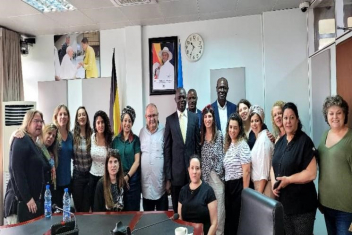 From May 8th to May 15th, a team of 26 Israeli social work professionals took part in a weeklong learning exchange with Ugandan social workers in order to share best practices and listen to inspiring and promising field stories in different domains of social work practice and along the continuum of social protection and care. The visit was led by Inbal Harmoni, President of the Israel Union of Social Workers; Reut Cohen, Union Director for the Jerusalem District; Dr. Ella, the Head of Quality Supervision at the Israel Ministry of Welfare; and Tami Morez, a senior Israel-East Africa Social Worker.
From May 8th to May 15th, a team of 26 Israeli social work professionals took part in a weeklong learning exchange with Ugandan social workers in order to share best practices and listen to inspiring and promising field stories in different domains of social work practice and along the continuum of social protection and care. The visit was led by Inbal Harmoni, President of the Israel Union of Social Workers; Reut Cohen, Union Director for the Jerusalem District; Dr. Ella, the Head of Quality Supervision at the Israel Ministry of Welfare; and Tami Morez, a senior Israel-East Africa Social Worker.
The learning exchange symbolizes a long-term working relationship and friendship between Israel and Uganda and encompasses themes emphasized in the 2020 to 2030 Global Agenda for Social Work and Social Development framework, namely: valuing social work as an essential service; transforming social protection systems; Ubuntu: strengthening social solidarity and global connectedness; promoting diversity and the power of joint social action; and co-building an inclusive social transformation.
While in Uganda, the Israeli social workers interfaced with frontline social workers employed at the Butabika National Mental Health Referral Hospital, social worker students participating in social work education and research at Makerere University, policy makers at the parliament of Uganda, and social workers involved in mental health programing with the Regional Psychosocial Support Initiative (REPSSI).
The social workers also visited REHORE, an urban refugee agency; Africa Renewal Ministries, a faith-based organization, and home to both Loving Hearts and Bethany children transitional homes, focused on taking care of abandoned minors and other at-risk children; Project-Ten; Days for Girls Uganda; and the National Association of Social Workers of Uganda.
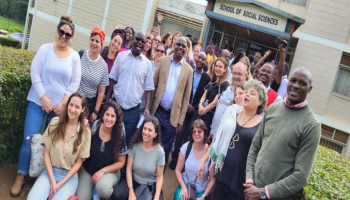 Throughout the visit, social workers in Uganda and their counterparts from Israel shared their unique interventions, experiences, guidelines, policies and social work frameworks along different practice domains. Social workers from both countries compared similarities and differences with a view to strengthening and re-enforcing individual social workers, social work agencies and sister professional bodies.
Throughout the visit, social workers in Uganda and their counterparts from Israel shared their unique interventions, experiences, guidelines, policies and social work frameworks along different practice domains. Social workers from both countries compared similarities and differences with a view to strengthening and re-enforcing individual social workers, social work agencies and sister professional bodies.
“I love Uganda - the climate, her welcoming people with Ubuntu values, green environment, organic food and fruits and unique animals and birds,” said Tami Morez, one of the Israel social work trip coordinators.
This Israel-Uganda social work learning experience presents a unique opportunity for the social work community to continue working and thinking about strengthening international professional networks, sharing social work models, innovative tools, frameworks and field experiences in different practice domains of social work practice for a well-planned, trained and supported social workforce. The Israel-Uganda social work engagement also opened new discussions around joint research and publications, sharing innovations, and networking in respect to 2020 to 2030 Global Agenda for Social Work and Social Development framework.

